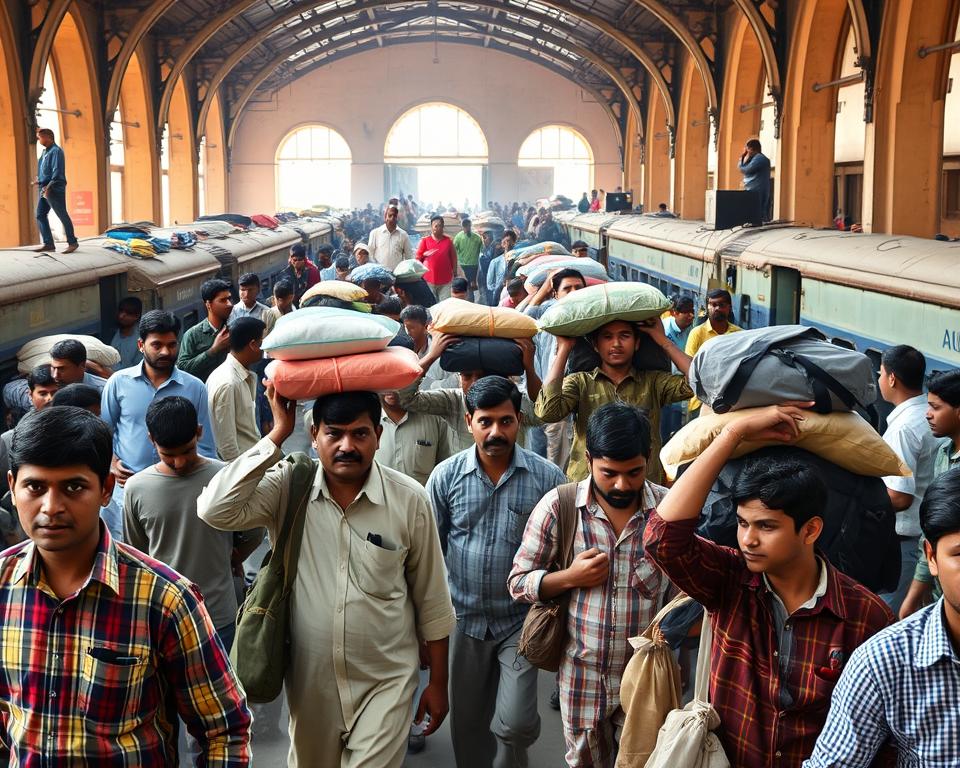Looking into porter jobs in India is a good choice for many. Entry-level spots are perfect for starting a career as a porter.
Being a porter means doing many tasks. You need to be physically strong and good with people. Job openings for porters exist in places like hospitals and hotels.
To start a porter career, you need to know what’s needed and how to apply. This article will help you understand these steps.
Key Takeaways
- Understanding the role of a porter in various establishments.
- Qualifications and skills required for entry-level porter positions.
- Where to find porter job openings in India.
- Steps to apply for entry-level vacancies.
- Career progression opportunities in the porter profession.
What Are Porter Jobs in India
Porters do many important jobs in India. They carry goods, luggage, or equipment from one place to another. Their work is key in healthcare, hospitality, and transport.

Definition and Core Functions
A porter job definition means doing many tasks. The core functions of a porter include lifting and moving items. They help people or patients and make sure things get to where they need to go safely.
In hospitals, porters move patients and medical stuff. In hotels, they help with guest luggage and other needs.
“The role of a porter is not just about physical labor; it requires a high level of customer service and the ability to work under pressure,” says an industry expert. This shows the job is more than just hard work.
Importance in Various Industries
The importance of porters in India is huge. In healthcare, they keep hospitals running smoothly. In hospitality, they make guests happy. At airports and stations, they help with luggage.
Porters are key to many industries working well. Their work is often unseen but very important. As one report says, “Porters are the backbone of many industries, providing a vital link in the service chain.”
Porter Jobs – Entry-Level Vacancies
Many industries in India are looking for entry-level porters. These jobs are key to keeping places like hospitals, hotels, and transport hubs running smoothly.

Current Demand for Entry-Level Porters
The need for entry-level porters is growing fast. This is because of the expansion of healthcare and hospitality. Hospitals and hotels need porters to move patients, luggage, and goods around.
Key industries driving the demand include:
- Healthcare
- Hospitality
- Transportation
Types of Available Positions
There are many types of porter jobs out there. You can work in hospitals, hotels, or even at airports and railway stations. Each job has its own tasks and needs.
With so many options, you can find a job that fits your skills and what you like to do.
Regional Opportunities Across India
Porter jobs are available all over India, but big cities and tourist spots have the most. Places like Delhi, Mumbai, and Bangalore are always looking for porters.
If you’re looking for a job, you might find one in your area. Or you could think about moving to a place with more porter jobs.
Essential Qualifications for Porter Positions
To be a porter, you need the right education, fitness, and people skills. The job needs a special mix of qualities. These help you do your job well.
Educational Requirements
The education needed for porters changes with the job. Usually, a high school diploma is enough. Some jobs might ask for special training or certificates, like in healthcare or hospitality.
Key educational requirements include:
- High school diploma or equivalent
- Industry-specific certifications or training
- Basic knowledge of first aid and safety procedures
Physical Fitness Standards
Porters need to be fit to do hard tasks, like lifting heavy things and standing a lot. Employers want people who can pass a fitness test.
Physical fitness standards may include:
- Ability to lift and carry heavy objects
- Endurance to stand and walk for long durations
- Good overall health and stamina
Necessary Skills and Attributes
To do well as a porter, you need certain skills and traits. These include:
“Good communication skills, teamwork abilities, and a customer-centric approach are essential for success in porter roles.”
Necessary skills and attributes include:
- Effective communication and interpersonal skills
- Ability to work as part of a team
- Customer service skills and a positive attitude
Key Responsibilities in Different Porter Roles
Knowing what porters do in different jobs is key for those starting out. Porter roles, though seen as entry-level, cover many important tasks. These tasks help various industries run smoothly.
Hospital Porter Duties
Hospital porters are vital in healthcare. They move patients, equipment, and supplies around the hospital. They also keep areas clean and tidy by moving furniture or equipment.
Effective communication skills are needed. They talk a lot with patients and hospital staff.
Hotel and Hospitality Porter Tasks
In hotels and hospitality, porters meet guests first. They help with luggage, give out information, and keep areas welcoming. They also help set up for events and conferences.
Excellent customer service skills are key. They make sure guests have a great stay.
Railway and Airport Porter Responsibilities
Porters at railway stations and airports handle luggage. They move bags to and from trains or planes using trolleys or carts. They also help by giving out travel info.
Their work is vital. It helps travellers move through transport hubs easily.
In short, porters do different things in different places. From healthcare to hospitality and transport, each job needs special skills. They must also be able to fit into their work environment.
Finding Porter Vacancies in India
Looking for porter jobs in India can be done in many ways. Job seekers have a better chance by using different methods.
Online Job Portals and Websites
Online job sites are great for finding porter jobs. Sites like Naukri.com, Monster India, and indeed.co.in have lots of porter jobs. You can filter by location, industry, and job type.
Online job sites offer many benefits:
- Wide range of job listings
- Upload your resume and get job alerts
- Learn about companies and read reviews
Government Employment Exchanges
Government job exchanges are also useful for finding porter jobs. They have databases of jobs in government places like hospitals and railway stations.
To use government job exchanges well, do this:
- Register at the local job exchange
- Keep your contact info and job wishes up to date
- Check for new jobs often
Direct Applications to Establishments
Applying directly to places that need porters is a good way to find a job. This includes hospitals, hotels, and airports.
When applying directly, remember to:
- Learn about the place and what they need
- Make a CV and cover letter that fits the job
- Visit in person to show you’re interested
Using these methods can help you find a porter job in India.
Creating a Successful Porter Job Application
To get a porter job, you need to show off your skills, experience, and personal traits. It’s important to know what employers want in a porter.
Crafting an Effective CV for Porter Positions
A good CV is key to making a strong first impression. For porter jobs, focus on your experience, fitness, and customer service skills. Use a clear layout and bullet points to list your past roles and achievements.
Key CV Elements for Porter Positions:
- Contact Information
- Professional Summary/Objective
- Relevant Work Experience
- Education and Certifications
- Skills (e.g., customer service, manual handling)
Writing a Compelling Cover Letter
A cover letter adds a personal touch to your CV. It should show your interest in the job, highlight your skills, and show you understand the role. Make sure to tailor it for each job you apply for, matching the job’s needs.
Gathering Required Documents and References
Along with your CV and cover letter, you’ll need extra documents. These include ID, educational certificates, and professional references. Have these ready and let your references know they might be contacted.
| Document Type | Description |
|---|---|
| Identification Proof | Aadhaar Card, Passport, or Driving License |
| Educational Certificates | School Leaving Certificate, Degree Certificate |
| Professional References | Contact details of previous employers or supervisors |
By focusing on these points, you can make a strong porter job application. This will help you get an interview.
Mastering the Porter Job Interview
Getting ready for a porter job interview is more than just knowing the questions. It’s about showing off your skills and qualities well. To do well, you need to show you’re strong, can talk well, and act professionally.
Common Interview Questions and Answers
Knowing common interview questions can really help you feel more confident. Some usual questions are:
- What made you want to apply for this porter job?
- How would you handle a tough physical task?
- Can you tell me about a time when you gave great customer service?
Think about good answers to these questions. Talk about your experiences and skills that fit the job.
Physical Assessment Preparation
The physical test is a big part of the interview. Make sure you’re fit and can lift and move heavy things. Practising tasks like:
- Lifting heavy weights
- Standing for a long time
- Moving fast when needed
will help you feel more ready for the test.
Professional Presentation Tips
Looking professional is key during the interview. Make sure you:
- Wear clean, ironed clothes
- Arrive on time, showing you respect the interviewer’s time
- Keep eye contact and speak clearly, showing your confidence and communication skills
By following these tips, you can make a good impression and boost your chances of getting the job.
Salary Expectations for Entry-Level Porters
The salary for entry-level porters changes based on the job and where it is. Knowing these points is key for those starting as porters.
Average Pay Scales Across Industries
Porters at the start of their career earn differently in various sectors. For example, those in hospitals earn more than those in hotels or airports.
| Industry | Average Monthly Salary (INR) |
|---|---|
| Hospital | 15,000 – 20,000 |
| Hotel/Hospitality | 12,000 – 18,000 |
| Airport/Railway | 10,000 – 16,000 |
Regional Variations in Porter Salaries
Where you work also affects your salary. Cities usually pay more than smaller towns or rural areas.
| Region | Average Monthly Salary (INR) |
|---|---|
| Metropolitan Cities (e.g., Mumbai, Delhi) | 18,000 – 25,000 |
| State Capitals (e.g., Bangalore, Chennai) | 15,000 – 22,000 |
| Smaller Towns/Rural Areas | 10,000 – 18,000 |
Working Conditions and Shift Patterns
It’s important to know about working conditions and shift patterns if you’re thinking about being a porter in India. Porters work in many places like healthcare, hospitality, and transport. Each place has its own way of working and hours.
Typical Working Hours and Schedules
Porters often work nights, weekends, and public holidays. In hospitals, they might work 12-hour shifts. This is to keep services running all the time. But, in hotels, they might have more regular hours. They might work more during busy times or special events.
Physical Demands of the Role
The job of a porter is physically demanding. They need to stand a lot, lift heavy things, and move big items or luggage. Being fit is very important for this job. Employers want people who can handle these tasks.
Workplace Environment Considerations
The place where porters work can be very different. Hospital porters work in a busy, clinical area. Hotel porters deal with guests more. But, all porters face challenges like manual handling risks and fast-paced work environments.
In summary, the work life of porters in India is varied. It depends on the job and where they work. They need to be ready for different hours, physical tasks, and environments.
Health and Safety Considerations for Porters
Keeping the workplace safe is key for porters. They do a lot of physical work in busy places. So, health and safety are very important.
Proper Lifting Techniques
Learning how to lift properly is vital for porters. Bad lifting can cause injuries like strains and long-term problems. To stay safe, porters should be taught to lift correctly.
This means bending at the knees, keeping the load close, and lifting with the legs. Not the back.
Occupational Hazards and Prevention
Porters face many dangers at work. These include injuries from lifting, accidents with equipment, and harmful materials. To lower these risks, workplaces need strong safety rules.
They should give out personal protective gear (PPE), hold safety training often, and keep equipment in good shape.
| Hazard | Prevention Measure |
|---|---|
| Lifting Injuries | Training on proper lifting techniques |
| Equipment Accidents | Regular maintenance of equipment |
| Hazardous Materials Exposure | Provision of PPE and safety training |
By paying attention to these health and safety points, employers can cut down injury risks. This makes the workplace safer for porters.
Career Progression Opportunities
Porters can grow their careers in many areas like healthcare, hospitality, and transport. With more experience and training, they can take on bigger roles or switch to new fields.
Advancement Paths in Healthcare Settings
In healthcare, porters can become senior porters or shift coordinators. They can also get into patient care or admin jobs. “Healthcare has a clear path for career growth,” says a healthcare HR expert.
Career Growth in Hospitality Industry
In hospitality, porters can become team leaders or supervisors. They oversee staff and manage daily tasks. They might also become concierges or customer service managers, using their people skills.
Progression in Transport and Logistics Sectors
In transport and logistics, porters can become supervisors or managers. They handle goods and ensure deliveries are on time. They might also work in operations or customer service, using their knowledge.
The role of a porter is a stepping stone for many careers. With experience and new skills, porters can make big strides in their careers.
Training and Skill Development for Porters
Porters get better at their jobs through training. These programs help them do their work better.
On-the-Job Training Programmes
Learning on the job is key for porters. They learn by doing, with help from those who know more.
- They get to practice with luggage, equipment, or supplies.
- They learn about safety and what to do in emergencies.
- They learn how to serve customers well and talk to them.
This training makes sure porters know their job well. They can do their tasks well.
Additional Certifications and Courses
There’s more to learn than just on-the-job training. Certifications and courses can make a porter better. These might include:
- First aid and how to handle emergencies.
- Learning about customer service and being friendly.
- Getting certified in lifting and moving things safely.
With these extra skills, porters can grow in their careers. They might even get promoted or find new jobs.
Legal Rights and Protections for Porters in India
In India, the law protects porters well. It makes sure they work in a safe place. Porters in healthcare, hospitality, and transport have rights under Indian law.
Labour Laws and Regulations
India has many laws to protect workers, like porters. The Industrial Employment (Standing Orders) Act, 1946, and the Shops and Establishments Act are key. These laws cover work conditions, pay, and how to solve disputes.
Important laws for porters include:
- The Minimum Wages Act, 1948, makes sure porters get fair pay.
- The Employees’ State Insurance Act, 1948, gives medical care and cash if they’re sick or hurt.
- The Payment of Gratuity Act, 1972, gives a big payment when porters retire or leave after a long time.
Employment Contract Essentials
An employment contract is very important. It lists what a porter’s job is and what they need to do. It should also cover:
- What the job is and what they have to do.
- How many hours they work and when.
- How much they get paid and when.
- How many holidays they get and when.
- How long they need to give notice if they leave.
A good employment contract helps both the porter and the employer. It makes sure they both get what they need from the job.
Success Stories: From Porter to Professional
Many have moved from being porters to professionals. Their stories are truly inspiring. Porter jobs are a starting point for many careers. They gain skills and experience that help them move up.
Inspirational Career Journeys
Rahul Sharma started as a hospital porter. He worked hard and got more training. Now, he’s a ward manager. His story shows how far you can go in healthcare.
In the hospitality world, Priya Desai went from hotel porter to front desk manager. Her journey shows the chances for growth in this field.
Lessons from Successful Porters
Successful porters share key traits. These include:
- A strong work ethic and willingness to learn
- Excellent communication and interpersonal skills
- The ability to adapt to new situations and challenges
As
“The key to success lies not in the role itself, but in how one approaches it. With the right mindset and skills, anyone can progress from a porter to a professional.”
By following these lessons, you can move forward in your career. Use your porter experience to reach your goals.
Conclusion
Porter jobs in India are available in many fields like healthcare, hospitality, and transport. These jobs need certain skills, physical fitness, and qualifications.
Looking at porter career chances, we see a bright future. With the right training, porters can move up or switch to other jobs.
The need for porters is clear in many areas. Knowing what the job involves, how much it pays, and the work conditions is key. This helps people choose the right career path.
Exploring porter jobs can lead to a rewarding career. As the job market changes, porters play a key role in keeping industries running smoothly.


